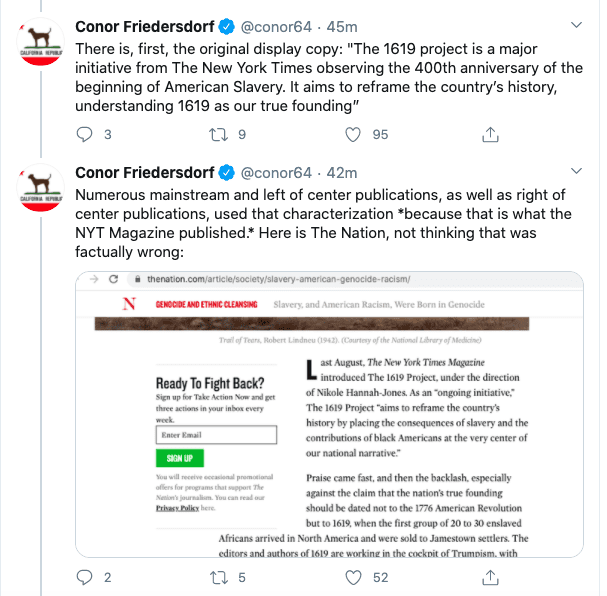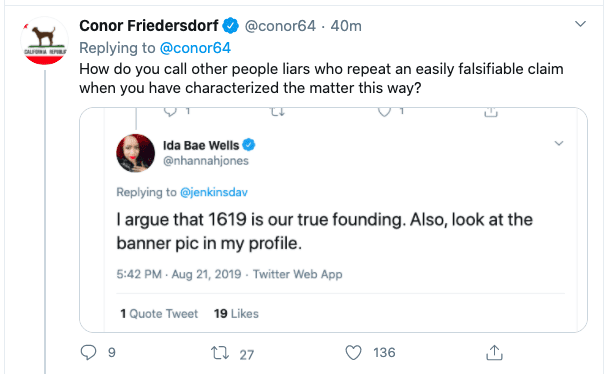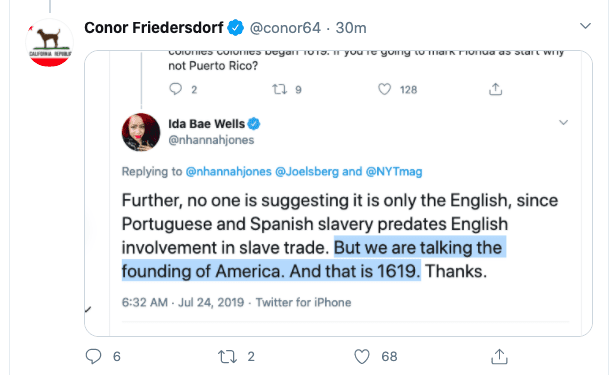Not So Fast, Nikole Hannah-Jones

The Atlantic‘s Conor Friedersdorf takes to Twitter to call out Nikole Hannah-Jones, the Pulitzer Prize-winning founder of The 1619 Project. Here is his masterful thread:
This claim is staggering. Because I wrote an essay arguing that The 1619 Project was great in parts, but was wrong to argue that 1619 was our “true founding,” I take exception to it. My essay is here: https://t.co/fh6JjqnGon Was I duped by “the right” or duping others? A thread: https://t.co/DhsON1NJ77
— Conor Friedersdorf (@conor64) September 18, 2020
Nikole Hannah Jones repeats this claim on CNN, where the interviewer credulously accepts her framing that the right is misrepresenting the project https://t.co/drU0CTZELS
— Conor Friedersdorf (@conor64) September 18, 2020
What triggered this response from Conor Friedersdorf? This tweet from NHJ:
One thing in which the right has been tremendously successful is getting media to frame stories in their language and through their lens. The #1619Project does not argue that 1619 is our true founding. We know this nation marks its founding at 1776. https://t.co/Af8sqr9YO7
— Ida Bae Wells (@nhannahjones) September 18, 2020
She’s mad that Trump called her project — which won her the Pulitzer Prize, a big movie deal with Oprah, and universal plaudits among the media elite — phony. From the Washington Post story to which NHJ links:
The federal government has no power over the curriculum taught in local schools. Nonetheless, Trump said he would create a national commission to promote a “pro-American curriculum that celebrates the truth about our nation’s great history,” which he said would encourage educators to teach students about the “miracle of American history.”
Trump is calling the panel the “1776 Commission,” in what appeared to be a barb at the New York Times’s 1619 Project. The project, whose creator won a Pulitzer Prize for its lead essay, is a collection of articles and essays that argue that the nation’s true founding year is 1619, the year enslaved Africans were brought to the shores of what would become the United States. Trump said Thursday the 1619 Project wrongly teaches that the United States was founded on principles of “oppression, not freedom.”
That is exactly what Nikole Hannah-Jones and The New York Times claim in The 1619 Project! But now that the president is pushing back hard by describing the project fairly and accurately, by its own words, she is now trying to change history (again).
It seems to me that this is the second win this week from the Trump administration, by taking the left’s racial rhetoric at its own word, and proceeding as if these leftists mean what they say. Princeton president Eisgruber says this university is shot through with racism? Oh dear, then the Education Department better investigate, because it is illegal for federal funding to go to a racist institution. And now that Trump has announced an initiative that stands to reveal the ideologically-driven falsehoods of The 1619 Project, and fight back against them being mainstreamed into US classrooms, Nikole Hannah-Jones is caught lying about what her own project actually says — and smearing people who engaged her in good faith.
It’s all such a grift. The Pulitzer Prize committee and The New York Times deserve this shame. In my forthcoming book Live Not By Lies, I cite the 1619 Project as an example of how totalitarians rewrite history to erase cultural memory, to make people easier to control. Excerpt:
Heda Margolius Kovály, a disillusioned Czech communist whose husband was executed after a 1952 show trial, reflects on the willingness of people to turn their backs on the truth for the sake of an ideological cause.
It is not hard for a totalitarian regime to keep people ignorant. Once you relinquish your freedom for the sake of “understood necessity,” for Party discipline, for conformity with the regime, for the greatness and glory of the Fatherland, or for any of the substitutes that are so convincingly offered, you cede your claim to the truth. Slowly, drop by drop, your life begins to ooze away just as surely as if you had slashed your wrists; you have voluntarily condemned yourself to helplessness.
You can surrender your moral responsibility to be honest out of misplaced idealism. You can also surrender it by hating others more than you love truth. In pre-totalitarian states, Arendt writes, hating “respectable society” was so narcotic, that elites were willing to accept “monstrous forgeries in historiography” for the sake of striking back at those who, in their view, had “excluded the underprivileged and oppressed from the memory of mankind.” For example, many who didn’t really accept Marx’s revisionist take on history—that it is a manifestation of class struggle—were willing to affirm it because it was a useful tool to punish those they despised.
Here’s an important example of this happening in our time and place. In 2019, The New York Times, the world’s most influential newspaper, launched the “1619 Project,” a massive attempt to “reframe” (the Times’s word) American history by displacing the 1776 Declaration of Independence as the traditional founding of the United States, replacing it with the year the first African slaves arrived in North America.
No serious person denies the importance of slavery in US history. But that’s not the point of the 1619 Project. Its goal is to revise America’s national identity by making race hatred central to the nation’s foundational myth. Despite the project’s core claim (that the patriots fought the American Revolution to preserve slavery) having been thoroughly debunked, journalism’s elite saw fit to award the project’s director a Pulitzer Prize for her contribution.
Equipped with this matchless imprimatur of establishment respectability, the 1619 Project, which has already been taught in forty-five hundred classrooms, will find its way into many more.
This is why The 1619 Project is so dangerous. It is also why I view a “1776 Commission” with real skepticism, if its point is to give an imprimatur to an official hagiographic view of American history. I don’t think we know what in particular Trump has in mind, and in any case the federal government doesn’t have the power to order schools to change their history curricula. Still, it’s revealing that Hannah-Jones has changed her story, claiming now that she only wants more attention paid to slavery. No, that is not at all what the 1619 Project is about. It is about establishing maintaining slavery as the raison d’être of the United States — a flat-out lie, one that, if true, would delegitimize everything about the American founding.
Trump forced her hand. Good. I wouldn’t claim Donald Trump as an Orange Thucydides, but he’s correct about the importance of history to identity: who we are and who we will become depends on who we think we were. Once again, from Live Not By Lies:
Forgetting the atrocities of communism is bad enough. What is even more dangerous is the habit of forgetting one’s past. The Czech novelist Milan Kundera drily observes that nobody today will defend gulags, but the world remains full of suckers for the false utopian promises that bring gulags into existence.
“Not to know what happened before you were born is to remain a child forever,” said Cicero. This, explains Kundera, is why communists placed such emphasis on conquering the minds and hearts of young people. In his novel The Book of Laughter and Forgetting, Kundera recalls a speech that Czech president Gustáv Husák gave to a group of Young Pioneers, urging them to keep pressing forward to the Marxist paradise of peace, justice, and equality.
“Children, never look back!,” [cries Kundera’s character Husak], and what he meant was that we must never allow the future to collapse under the burden of memory.
A collective loss of historical memory—not just memory of communism but memory of our shared cultural past—within the West is bound to have a devastating effect on our future. It’s not that forgetting the evils of communism means we are in danger of re-creating precisely that form of totalitarianism. It’s that the act of forgetting itself makes us vulnerable to totalitarianism in general.
Put another way, we not only have to remember totalitarianism to build a resistance to it; we have to remember how to remember, period.
Everything about modern society is designed to make memory—historical, social, and cultural—hard to cultivate.
Christians must understand this not only to resist soft totalitarianism but also to transmit the faith to the coming generations.
In his 1989 book, How Societies Remember, the late British social anthropologist Paul Connerton explains that there are different kinds of memory. Historical memory is an objective recollection of past events. Social memory is what a people choose to remember—that is, deciding collectively which facts about past events it believes to be important. Cultural memory constitutes the stories, events, people, and other phenomena that a society chooses to remember as the building blocks of its collective identity. A nation’s gods, its heroes, its villains, its landmarks, its art, its music, its holidays—all these things are part of its cultural memory.
Connerton says that “participants in any social order must presuppose a shared memory.”Memory of the past conditions how they experience the present—that is, how they grasp its meaning, how they are to understandit, and what they are supposed to do in it.
No culture, and no person, can remember everything. A culture’s memory is the result of its collective sifting of facts to produce a story—a story that society tells itself to remember who it is. Without collective memory, you have no culture, and without a culture, you have no identity.
The more totalitarian a regime’s nature, the more it will try to force people to forget their cultural memories. In Nineteen Eighty-Four, the role of Winston Smith within the Ministry of Information is to erase all newspaper records of past events to reflect the current political priorities of the Party. This, said the ex-communist Polish intellectual Leszek Kołakowski, reflects “the great ambition of totalitarianism—the total possession and control of human memory.”
“Let us consider what happens when the ideal has been effectively achieved,” says Kołakowski. “People remember only what they are taught to remember today and the content of their memory changes overnight, if needed.”
People remember only what they are taught to remember today… . What Nikole Hannah-Jones, The New York Times, the Pulitzer Prize committee, and all their allies are doing is striking at the foundation of the American constitutional order. Now that the president has called it out, NHJ is lying to obscure her real intentions, and the truly revolutionary nature of The 1619 Project. Don’t let her get away with it.
UPDATE: You will recall that Winston Smith’s job was to rewrite history in newspaper archives to reflect the party line:
Can the @nytimes's #1619project get any more dishonest? They appear to have edited their own website to remove the claim that 1619 was America's "true founding" some time between August 2019 and @nhannahjones's denial today that she ever intended to claim that. pic.twitter.com/3oQtLJDcQd
— Phil Magness (@PhilWMagness) September 18, 2020






